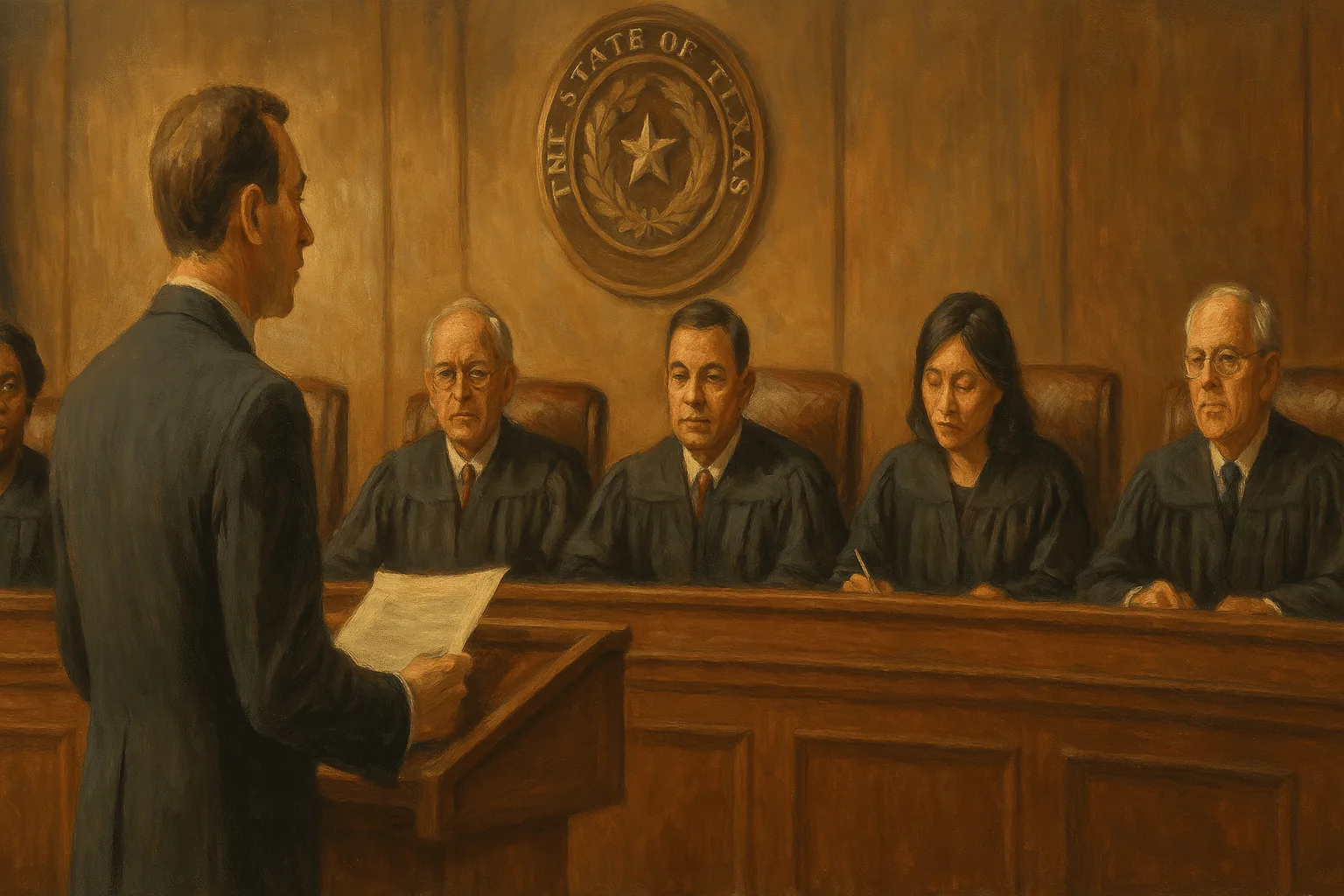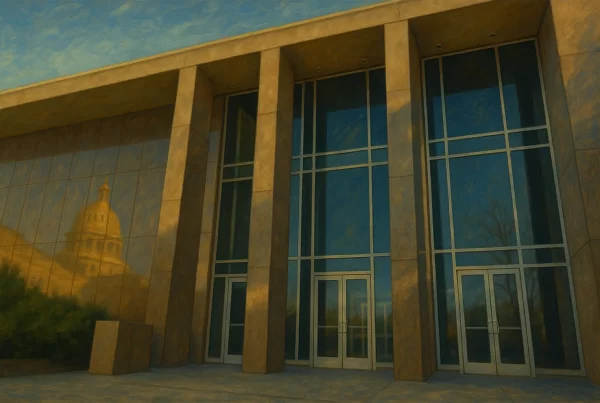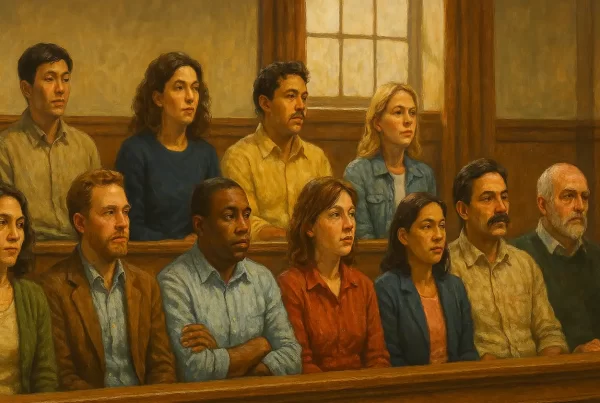Texas Courts of Appeals serve as the intermediate appellate courts in the Texas judiciary, reviewing cases appealed from district courts and county courts, both criminal and civil.
They play a crucial role in ensuring fair application of the law by correcting legal errors and clarifying legal principles. Positioned between trial courts and the state’s highest courts, these appellate courts provide a critical check on judicial decisions, ensuring consistency and fairness in legal interpretations. They review both civil and criminal cases, examining whether trial courts correctly applied the law rather than re-evaluating factual disputes.
For instance, a defendant convicted in a district court may appeal to the appropriate Court of Appeals, arguing that the trial judge improperly admitted evidence or misapplied a statute; the appellate court then reviews only the legal questions, not the facts.
Jurisdiction
Each court of appeals hears cases from lower courts within a specific region of the state. For example, the Third Court of Appeals in Austin hears cases from 24 counties in Central Texas. This regional system helps manage the large number of appeals efficiently.
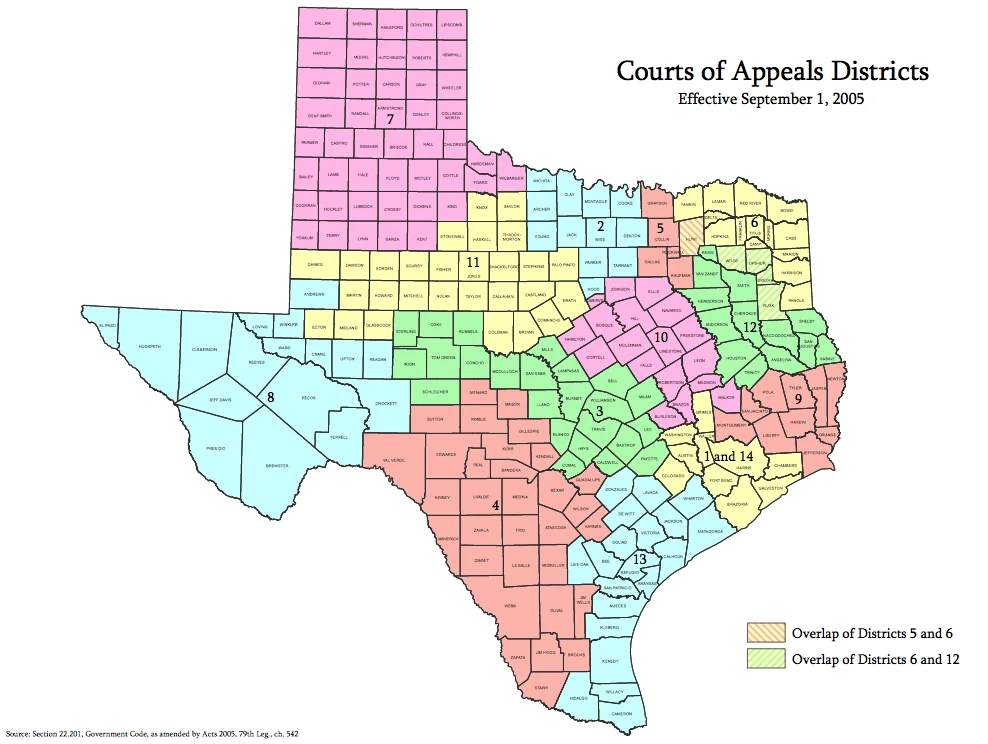
In total there are 14 regional courts of appeal throughout the state of Texas. Additionally, the Fifteenth Court of Appeals, established in 2023, has statewide jurisdiction over civil cases involving state agencies, constitutional challenges, and the newly created Texas Business Courts. The court, based in Austin, has three justices.
Occasionally, these Courts of Appeals hear cases from counties outside their territorial jurisdiction. This happens by order of the Texas Supreme Court, which regularly transfers batches of cases from one court to another in order to equalize caseloads.
Courts of criminal appeal do not have jurisdiction in death penalty cases, which go directly from trial courts to the Court of Criminal Appeals.
Advertisement
Size of the Courts of Appeals
Texas’ regional appellate courts vary in size from three justices to 13, depending on factors such as population size, caseload volume, and historical legislative decisions. Each court has one chief justice and at least two associate justices. In total, 83 judges serve on the 15 courts.
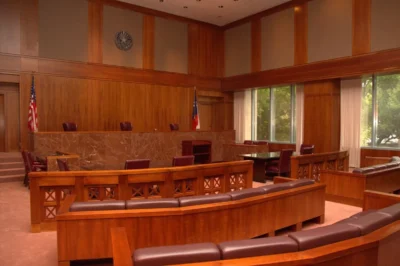
The size of each court is set by law, not by the constitution, so the legislature has the power to change the size and territory of each appeals court.
For example, the Second Court of Appeals in Fort Worth (pictured, top), is composed of seven justices. The Fifth Court of Appeals in Dallas has 13 justices, the Ninth Court of Appeals in Beaumont has four justices, and the Twelfth Court of Appeals in Tyler has three.
Typically each court decides cases in panels of three justices, though occasionally the entire court sits en banc to reconsider a prior panel decision. When a court sits en banc, all its justices hear the case together rather than in three-judge panels, usually to resolve conflicts in prior decisions.
Advertisement
Election of Justices
Appellate judges in Texas serve six-year terms and are elected directly. Texas is one of the few states where judges run as partisan candidates, which means that judicial candidates are listed on ballots as either Republicans, Democrats, or some other party. Judicial candidates also compete in primary elections.
Vacancies between elections are filled by the governor, subject to confirmation by the state senate.
Qualifications of Justices
In order to qualify to serve as an appellate judge, a candidate must be:
- a citizen of the United States;
- a resident of Texas;
- age 35 to 74; and
- a practicing lawyer, or a judge, for at least 10 years.
Appeals to the High Courts
The courts of appeals are the middle level of the Texas judicial system. In many cases, their decisions are final, but in other cases they can be appealed.
When a case is appealed from a court of appeal, it goes to one of Texas’ two high courts, either to the Texas Supreme Court in a civil case, or to the Court of Criminal Appeals in a criminal case. However, the high courts accept only a small percentage of appeals, meaning most appellate rulings remain final.
Precedents
The decisions of Texas Courts of Appeals set binding precedents for lower courts within their respective regions. This means that trial courts must follow the interpretations and rulings issued by their regional appellate court when deciding similar legal questions.
Additionally, Texas has a unique system in which some appellate decisions can carry statewide precedential force. Since 1927, the Texas Supreme Court has had the power to refuse to hear an appeal in a way that signals agreement with the lower court’s decision. The technical term for this is refusing an application for a writ of error.
When the high court refuses a writ rather than denying it, this signifies approval of the appellate ruling as the law of the state, effectively making that decision binding precedent statewide. As a result, thousands of appellate rulings have become de facto Texas Supreme Court precedents over time.
This unique precedential effect applies only to civil cases. In criminal cases, the Texas Court of Criminal Appeals does not follow the same process. Instead, decisions of the courts of appeals in criminal cases remain binding only within their respective districts unless the Court of Criminal Appeals explicitly issues a ruling on the matter.
Courts of appeals also have the ability to overrule their own prior precedents, as long as this does not conflict with prior rulings of the Texas Supreme Court or Court of Criminal Appeals. This allows appellate courts to correct or update legal interpretations as needed.
Precedents help ensure consistency in Texas law, guiding judges, lawyers, and the public while also allowing for changes when necessary.
Court Personnel
Each court of appeals employs clerical and legal staff to assist the justices in processing complex cases, researching and drafting orders and opinions, disposing of motions, and managing accelerated and emergency matters.
These appellate courts typically employ one or two staff attorneys per justice, who are experienced appellate lawyers, plus legal assistants.
Administrative and IT personnel are supervised by a chief clerk of the court.
On average, the courts of appeal spend more than 95% of their budgets on the salaries and benefits of employees. Funding for all the courts of appeals comprises less than 0.04% of the state budget as a whole.
Most appellate opinions and case dockets are publicly available online, allowing citizens and attorneys to track rulings and legal trends across the state.
📚 Related Books
Dive deeper into this topic with these handpicked titles:
- Principles of Appellate Advocacy (Aspen Casebook Series)
- The Small Firm Roadmap Revisited: A Guide to the Healthy Law Firm of Your Future
- Business Law: Text and Cases
Texapedia earns a commission from qualifying purchases. Earnings are used to support the ongoing work of maintaining and growing this encyclopedia.
